
Hiring Trends Index: a look at the recruitment landscape of Q2 2022
Table of Contents
- Key findings at a glance
- Top takeaways
- The last three months
- Recruitment in Q3 2022
- Working abroad
- Hiring overseas
- Workforce shifts since Covid-19
- Flexible working
- Attract, hire and retain staff with product solutions
The Q2 2022 edition of the Hiring Trends Index takes an in-depth look at the key labour market trends 1,000 HR experts anticipate in 2022, alongside what 2,582 UK workers intentions and views are on workplace flexibility. This edition has a particular focus on global hiring and international talent.
Hiring Trend Index – key findings at a glance
With vacancies continuing to remain at a record high, businesses are looking into alternative routes to fill them. Half of businesses are planning to hire from overseas within the next year, with a third having already increased international hiring since the outbreak of Covid-19 (March 2020). Despite this though, almost a fifth (18%) of businesses say they can’t hire from overseas because it is too difficult, even though one in ten say they want to increase overseas hiring.
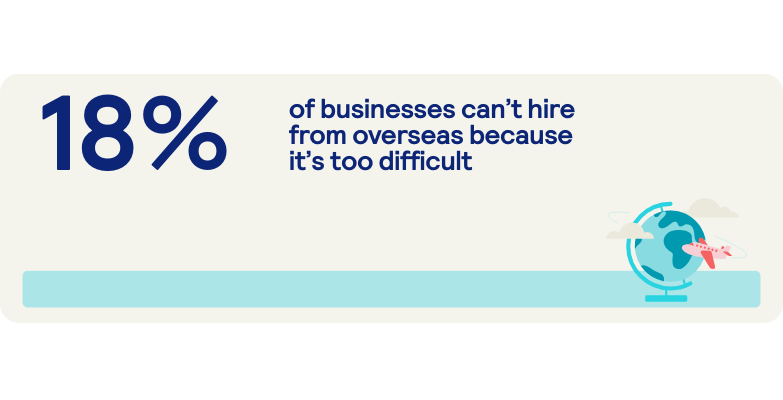
On the other hand, employees are struggling to achieve a good quality of life in the UK and feel they are more likely to find this abroad. This is further exacerbated by the rising cost of living in the UK, preventing salaries from stretching as far as they previously did. We also see a high drive to travel which could be a pent-up desire, now the world has opened up following relaxed Covid-19 restrictions
Top takeaways from the Hiring Trends Index Q2 2022
- Record job vacancies remain, although the rate of growth continues to slow. Meanwhile, inflation in the UK continues to climb and political instability could bring further challenges.
- UK workers are noticing the strain on the economy, which is affecting their overall quality of life, pushing them to consider leaving the UK for a better lifestyle. In fact 4,588,357 UK workers would consider moving abroad for work (13%).
- Employers are aware of the skills gap that doesn’t seem to be closing and many are planning to introduce global hiring and expand workplace flexibility benefits.
- Over half (52%) of businesses plan to hire staff from overseas to work in their UK workplaces, both from within the EU and outside of the EU.
- Overall, businesses want to hire internationally but are facing challenges, which come in multiple forms including visa availability, the perception of the UK globally, and international outreach.
The last three months
As of July 14th 2022, the latest ONS data shows the number of job vacancies in March to May 2022 has risen to a new record, but growth is slowing.
In Q2 2022, over three quarters (79%) of businesses recruited and a fifth did not recruit, compared to 22% in Q1 2022. A quarter (24%) of businesses saw no change in their workforce at all, a slight decrease since last quarter (26%).
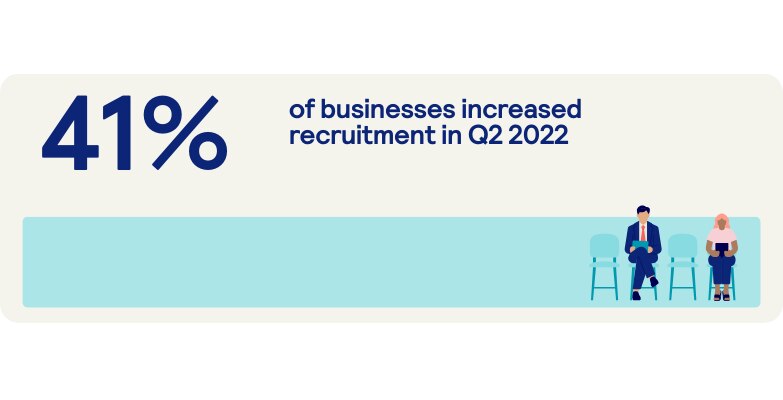
Of those that did recruit in Q2 2022, 41% of businesses increased their hiring and 9% introduced a new hiring model, which was the same amount reported in Q1 2022. Contrastingly, 12% of businesses paused recruitment at some point during Q2, but only 6% decreased recruitment.
The average time to hire for Q2 2022 was 6.76 weeks, almost a one week increase since Q1 (6.04 weeks), highlighting the gap between businesses wanting to hire, but not getting the people they need for the roles at the right time. Industries most likely to have increased recruitment include media/marketing/advertising/PR and sales (46%), IT and telecoms (45%), medical & health and hospitality & leisure (both 43%). Skills shortages are expected to have the biggest impact in tech/IT (24%), operations (23%) and sales (15%), according to employers.
Similarly to Q1, 21% of businesses saw an increase in total hours worked, while only 9% saw a reduction, displaying the impact unfilled vacancies are having on staff. With persistent skills shortages, staff are still facing heavy workloads, which has been a trend throughout this year. This looks as though it is set to continue, with 30% of businesses saying skills shortages will continue to be a key challenge in Q3 2022.
Recruitment in Q3 2022
Half of businesses are confident they will recruit the people they need next quarter, falling slightly from 53% reported in Q1.
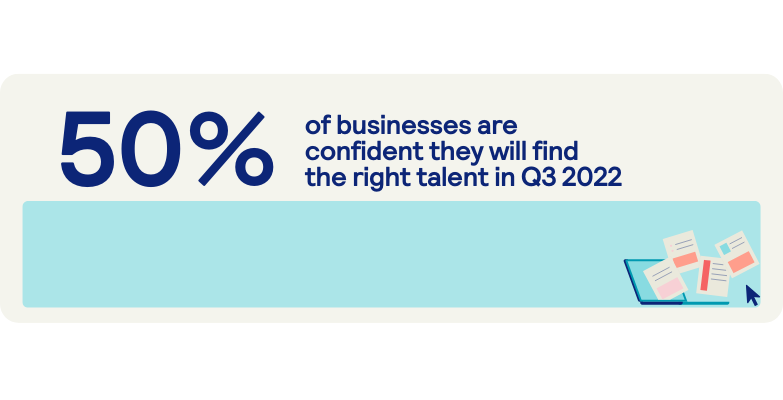
In Q3 2022, 31% of businesses intend to increase recruitment, a quarter intend to increase recruitment spend for specialist roles, and 13% are planning to pause recruitment. This is up from 11% in Q1, while only 5% intend to decrease recruitment. Meanwhile, one in ten are planning to take steps to make talent pools more diverse, and only 5% expect to introduce a new hiring model.
Surprisingly, 11% of businesses don’t expect to recruit at all next quarter, despite 30% of businesses reporting skills shortages and a quarter (26%) declaring labour shortages. In addition, 23% of employers say helping staff manage their workloads will be a challenge in Q3, and 22% say replacing staff following resignations is a key challenge.
Working abroad
Over one in ten (13%) UK workers are considering moving abroad for work, while over a fifth (23%) would consider it if it were part of a job package. Of those that are looking to move, 9% say moving outside the UK is a long-term goal, while 3% are actively planning to relocate within the next two years. On the other hand, 43% of UK workers would not consider moving outside of the UK for work, while 15% would consider moving, but for non-work related reasons.
Interestingly, when age is considered, the data shifts. Young people are the most likely to consider moving abroad, with 30% of 18–24 year olds having this in mind. Similarly, a quarter of people from this age bracket would move abroad as part of a job package. Over a quarter (27%) of 25-44 year olds would consider a move abroad as part of a job package, and Londoners are also more likely to want to move abroad compared to other UK regions, at just under a quarter (23%).
Reasons to leave
The majority of people (65%) who are considering moving abroad want a better quality of life. This desire increases to 69% for people aged 35-44, closely followed by 68% of 45-54 year olds. The figure slightly decreases for younger demographics – at 63% for 25-34 year olds and 53% for 18-24 year olds.
This data ties into the recent inflation increase and the rising cost of living, which is also a top reason for those considering moving out of the UK. Over two fifths (44%) of people overall are considering moving abroad due to the rising cost of living, with people aged 35-44 even more likely to cite this (48%). It also seems to be a concern for people living in London, as 53% of Londoners say the cost of living is a factor for them.
Predictably, younger people aged 18-25 are more likely to have a desire to travel more (52%), which is over 10 percentage points more than the national average. This statistic reduces by 10 percentage points for those aged 35 and above (31%). This is possibly due to the impact Covid-19 has had on young people, where some have recently left school or university when the pandemic first erupted, and travel restrictions were at their peak.
Interestingly, 21% of people believe there are better career opportunities within their desired industry abroad, and 11% would consider leaving the UK as there is a lack of flexibility with their current employer. Employers should consider that for many people, moving abroad may only be temporary, so, if businesses open up opportunities to work from anywhere, they can better retain talent.
Hiring overseas
With skills and labour shortages remaining high, employers are beginning to, or continuing to, look for talent outside of the UK so they can meet business needs. Half (52%) of businesses plan to hire staff from overseas to work in their UK workplaces in the next year.
Of those planning to hire from overseas, 14% are planning to hire outside of the EU, which they have done in the past, while 8% are planning to do this for the first time. In addition, 21% are planning to hire from within the EU, which they have done in the past, however 9% are planning to hire from the EU for the first time. Contrastingly, less than a third (29%) don’t plan on hiring from overseas, as they’re confident they can find suitable candidates in the UK.
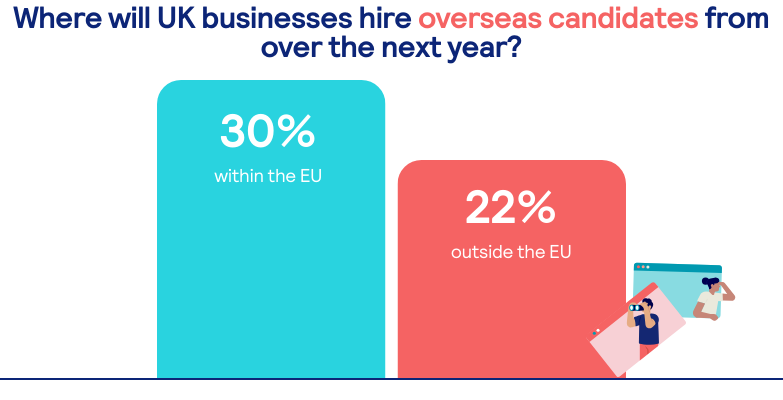
A fifth (18%) of businesses won’t even attempt to hire from overseas because they feel it is too difficult and 1 in 10 businesses actively want to increase their overseas hiring but are finding it difficult to implement.
When it comes to the challenges businesses are facing when hiring from overseas, 16% of businesses list UK immigration rules to be one of the biggest barriers limiting international talent pools. The perception of the UK is also a notable factor, with 23% of businesses agreeing that the UK is less appealing for workers from overseas due to factors including the rising cost of living. This is having an impact on the number of EU candidates, as 16% of businesses are seeing applications decrease. Off the back of this, 23% of businesses want to see the UK government relax working visa restrictions to help international hiring.
Workforce shifts since Covid-19
Since the start of the Covid-19 pandemic, the dynamics of workplaces have changed, and the impact of globalisation is clear. A third (32%) of businesses have hired more overseas candidates since Covid-19. On the other hand, the percentage of the workforce hired from the UK is also beginning to shift. Half (52%) of businesses have hired around the same amount of candidates from the UK pre and post Covid, while 28% of businesses have hired more UK candidates since the pandemic, and 13% have hired less.
In addition, nearly a quarter (23%) of businesses have hired the same percentage of candidates from within the EU since Covid-19, only 6% have hired more, and 32% have hired less. This could be due to Brexit-related law changes and perceptions of the UK.
When it comes to hiring a workforce from outside of the EU, including candidates based in Africa, North America, South America, Asia and Australasia, the majority of businesses have maintained the same level of hiring, although small numbers of HR experts report changes to their rate of international recruitment since Covid-19.
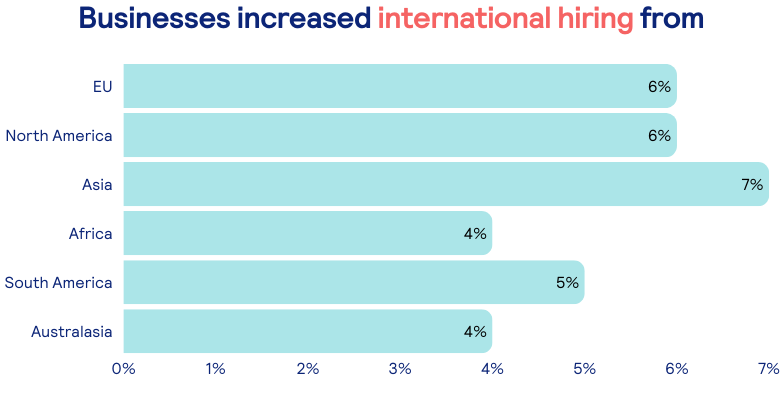
Flexible working
Since the beginning of the pandemic, businesses have increased flexibility in the ways people can work. The most apparent change to this is the location in which people work. Although at one point working from home was a staple for many jobs due to Covid-19 restrictions, for some this culture has evolved, and some workers want the option to work in different country altogether.
Businesses are feeling the pressure when it comes to meeting the needs of staff in terms of flexible working. During the interview stage, a quarter (26%) of businesses report an increase in questions from candidates regarding flexible working. This trend continues with current staff too, with 15% of businesses saying they have had an increase in requests to ‘work from anywhere’ over the last year, with staff wanting to work in other locations both UK-wide and overseas. The same percentage are getting more requests about 4 day working weeks. This has had a clear influence, as 12% of businesses have altered their benefits package to include ‘work from anywhere’ benefits.
From the workers’ perspective, almost a fifth (18%) would like the option of working from overseas for an extended period of time, however some go even further, and the same percentage report they would be more likely to continue working with their current employer if they were offered the opportunity to work overseas in their current role.
Meanwhile, some workers have already began to make the most out of flexible working options by working in different locations. One in ten workers have already carried out their current job somewhere different to where they are typically based, and the same number say they would take a job where they could work from anywhere, even if it meant a lower salary. This shows for a handful of workers, they value this benefit above pay, even in today’s climate.
Interestingly, 15% of UK workers expect their employer to offer ‘work from anywhere’ benefits – which 10% of businesses have already introduced. In addition, 11% of UK workers are actively looking for a new job that gives them greater flexibility in terms of where they work. Businesses are clearly seeing this shift as almost one in ten (8%) are concerned their employer brand is no longer competitive due to the lack of flexibility offered.
Businesses continue to face a uniquely competitive recruitment landscape, with skills shortages and staff retention remaining top challenges. These trends look set to continue; particularly as younger people in particular are more likely to turn to opportunities overseas. Meanwhile, those who remain are expecting a greater degree of flexibility to work where they want. These challenges, compounded by the difficulties of hiring internationally, have the potential to exacerbate the critical drain on talent in the UK.
In response, employers should consider their offering for international candidates and how they can compete on a global scale. That could be giving workers greater flexibility to work anywhere they want in the world or developing relocation packages to hire people currently based overseas. Of course, there are associated challenges involved at a policy level that can restrict plans, even while some businesses look to increase their international recruitment.
For businesses who are looking to attract skilled workers from overseas, Totaljobs Global Hiring sees an international partnership of job platforms designed to make hiring more straightforward, allowing UK employers to quickly reach talent, wherever they’re based.
Jon Wilson, CEO of Totaljobs
Attract, hire and retain staff with product solutions
Totaljobs don’t just post roles; we can support the end-to-end hiring process of businesses looking for the next member of their team.
Global Hiring – international recruitment made simple
Half of employers are planning to hire from overseas in the next year, however many are still facing a variety of challenges that complicate the process. In fact, a fifth of employers will avoid hiring from overseas simply because it’s too difficult. That’s why Totaljobs’ Global Hiring is built to keep things straightforward, whether you’re a UK based employer looking to attract candidates from overseas to relocate, or you want to hire remote workers based across the world. For larger employers hiring in multiple locations, keep things simple with one account manager who speaks your local language and works in your time zone, so you can recruit the people you need, wherever you need them, through the world’s largest alliance of market leading job platforms.
About the research
Now in its second year, the Totaljobs Hiring Trends Index is a quarterly deep-dive into the trends that are shaping businesses now, and in the months and years to come. The Q2 2022 edition asked HR Decision Makers about their recruitment plans and experiences from April-June 2022 and looks ahead to the next three months in the labour market, as well as diving into global recruitment and workplace flexibility.
HR Decision Makers sample
All figures, unless otherwise stated, are from YouGov Plc. Total sample size was 1000 adults. Fieldwork was undertaken between 23rd June – 11th July 2022. The survey was carried out online. The figures have been weighted and are representative of British business size.
UK workers sample
All figures, unless otherwise stated, are from YouGov Plc. Total sample size was 4402 adults. Fieldwork was undertaken between 23rd – 27th June 2022. The survey was carried out online. The figures have been weighted and are representative of all UK adults (aged 18+). The extrapolated figure is based on a population estimate of 38,236,303 UK working adults. Working full time (30 or more hours per week), working part time (8-29 hours per week), Working part time (less than 8 hours a week). Findings based on a population estimate for the UK of 67,081,234.
Explore articles
Receive the latest recruitment resources and
advice to boost your hiring
By providing us with your details you agree to our privacy policy and for us to keep you updated with the latest news, events,
and special offers from Totaljobs.






